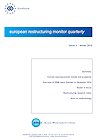European Restructuring Monitor Quarterly - 2010, Issue 4

Sovereign debt issues dominated the agenda in the final quarter of 2010 as a second EU Member State, Ireland, required EU-IMF intervention in November to stave off default. Given similar concerns in other Member States a focus on the health of the euro and on individual government deficits and access to market funding was expected to continue throughout 2011.
Rising public deficits and nervous bond markets prompted major spending cuts in Member States including those considered at low risk of default. Contracting public spending was felt likely to initiate a decline in state sector employment, largely spared thus far from the fallout of the 2008–9 recession. Other potential brakes on growth included an ailing financial sector and debt deleveraging, affecting access to credit and depressing consumption.
On a more positive note, some European economies – notably Germany and Sweden – were benefitting from a more vigorous than expected recovery inspired by demand from emerging and BRIC economies while Poland continued to enjoy healthy growth levels and the Baltic states – Estonia notably – had begun to emerge from their recent recession/depression.




